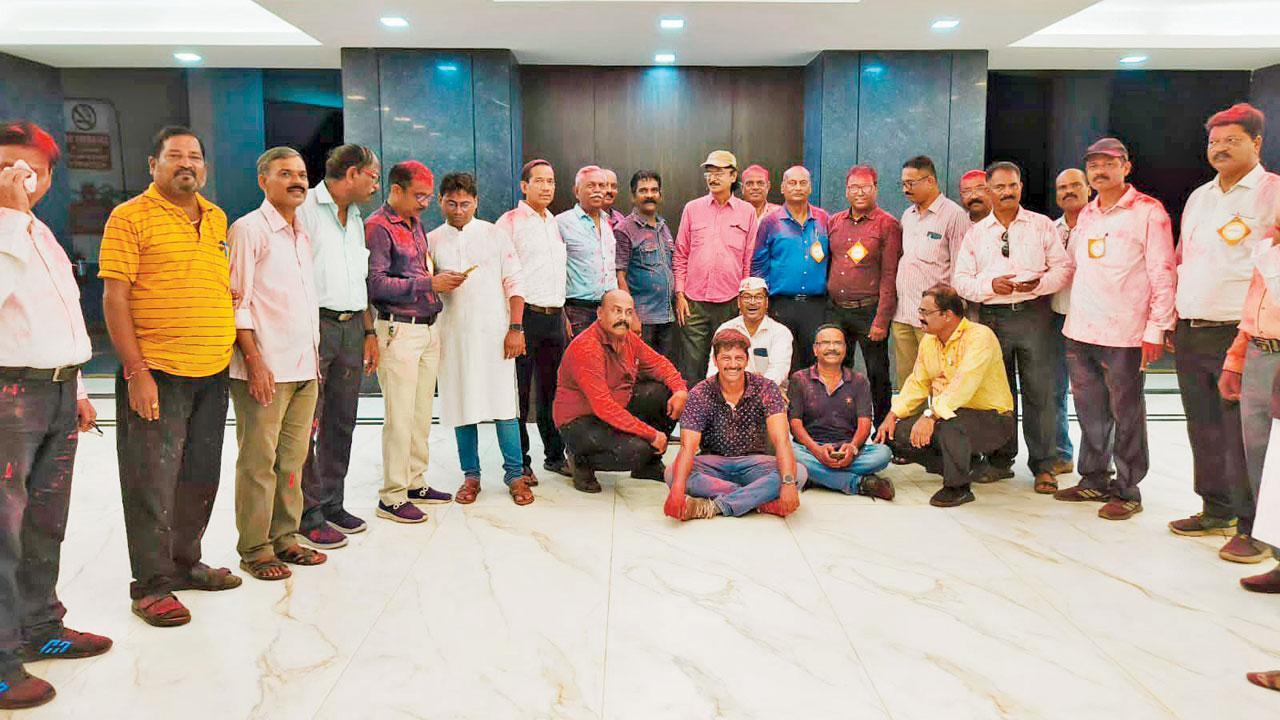Urban planner Chandrasekhar Prabhu has agreed to guide the policemen who recently won the housing society elections

Dhyas Swayamvikasacha, the panel led by cops which won the housing society elections
If all goes well, the newly elected committee of a police housing project in Vayal, Khalapur, near Panvel, stalled for over a decade, will be executing the project through self-development. The aggrieved policemen were victorious in the cooperative housing society’s elections held in October. Urban planner Chandrasekhar Prabhu will be guiding the self-development.
ADVERTISEMENT
Self-development is where the owners of land (residential/commercial) develop it without the help of a developer,” said Prabhu. The project planned on a 120-acre plot that can accommodate 5,000 houses is meant for policemen in the lower ranks like constables, havildar and naiks. It was delayed due to alleged malpractices by retired IPS officers previously involved in the project.
Handover of charge awaited
The newly formed committee is from the ‘Dhyas Swayamvikasacha’ (which translates to quest for self-development) panel led by the policemen. The cops in the committee include constables, head constables, assistant sub-inspectors and sub-inspectors, both retired and serving. The committee claimed that the official handover of charge has not been done by expelled members after they lost the elections on October 8.
“Three letters have been sent to the cooperative department officials directing them to take possession of the previous committee’s assets and hand them over to us. The previous committee was operating from rented premises in Sanpada. We are waiting for the assistant registrar of the cooperative department, Khalapur, to get possession of the office,” said a member of the new committee. “We are seeking guidance from Prabhu and senior bureaucrats, who have all agreed to guide and support us. Proactive support from all corners can help us build our dream homes,” the member added.
1st self-development in 1916
In an Annual General Meeting (AGM) on March 31, members of the Brihanmumbai Police Sahakari Gruhnirman Society had unanimously decided to pursue self-development. Welcoming their move, Prabhu said, “Self-development has existed for over a century. The Saraswat Cooperative Housing Society in Gamdevi was built on this model in 1916. Between 1916 and 1980, most of Mumbai’s development (residential and commercial) was by self-development. Cricketers, IPS officers and politicians have come up with self-developed towers in and around Mumbai. Over 50 buildings in Navi Mumbai, including those of IAS and IPS officers, were made through self-development.”
Explaining the process of self-development, Prabhu said, “Profit earning comes into the picture when developers are hired to develop such huge plots. In self-development, the housing society can utilise the additional Floor Space Index (FSI) by determining the area they would need and allotting the rest to other buyers, who would get the area at a discounted price. In this way, the buyers and policemen will benefit as the policemen do not have shell out more money.”
“Moreover the usable FSI today is much more than what it was when the land was procured. The housing society can approach prospective buyers like the CIDCO, Railways, nationalised banks, etc. who can build the colony for their staff and the policemen, thereby making it a win-win situation for all.”
Advocate claims delays
Advocate Siddharth Ingle, who represents the policemen, claimed delays on the part of the cooperative department. He said, “It is unfortunate that the assistant registrar of cooperative department, Khalapur, for reasons best known to him, is delaying the handover to the new committee. The new committee needs to take possession of the bank accounts, frozen by the cooperative department when the previous committee was expelled, to understand the society’s financial situation.”
Ingle added that two portions of land, each procured in the name of IPS officers, one of whom was also named chief promoter of the project, have to be transferred in the name of the housing society. “This process will take time. The committee has been elected for a five-year tenure. This work cannot be done without the support of the cooperative department and state bureaucrats.”
Expert view
Advocate Shreeprasad Parab, expert director, Maharashtra State Housing Federation, said, “Large plots have high potential and high cost. Housing societies opting for self-development may struggle in terms of having the right expertise, professional management, and adequate finance. It would help the housing society to follow the law and keep stringent checks.”
At the same time, self-development of large plots also offers several benefits. Parab added, “A major benefit is that the entire profit is indirectly distributed to the existing members through extra carpet area and corpus fund. They would also have minimum litigations as there is no third party involved. The project can be executed with full adherence to UDCPR (Unified Development Control and Promotion Regulations). Full control of the project also means that members can choose to have green projects or amenities that they prefer. Lastly, the process strengthens the cooperative movement by generating affordable housing stocks since profit is not the sole motive in such projects.”
120
Area (in acres) of project land in Khalapur
 Subscribe today by clicking the link and stay updated with the latest news!" Click here!
Subscribe today by clicking the link and stay updated with the latest news!" Click here!







